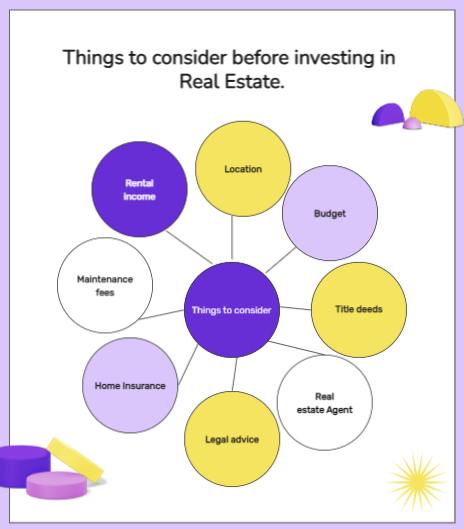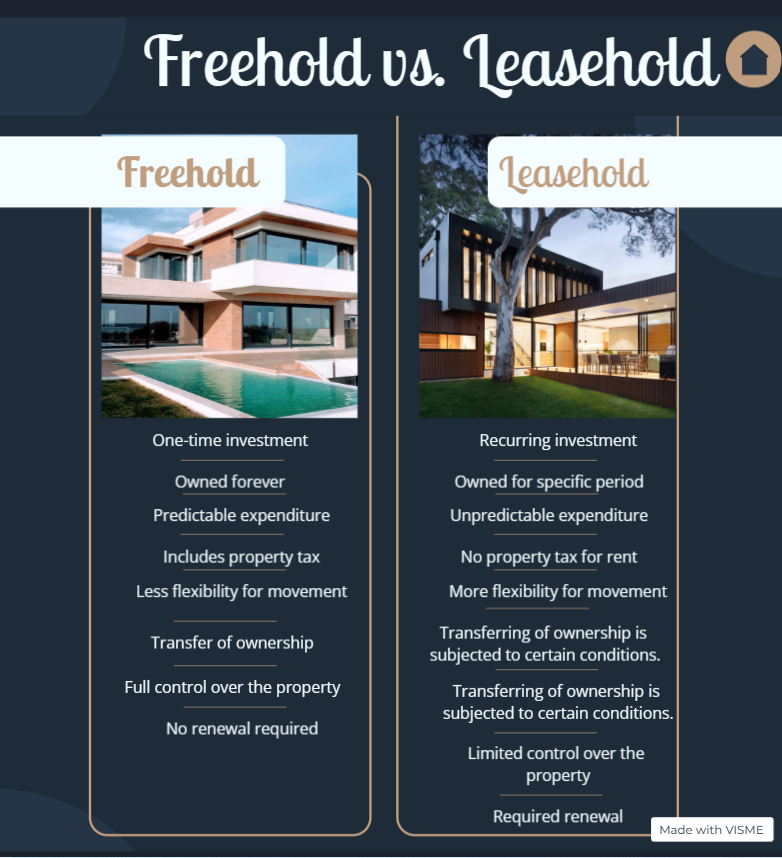10 things you need to know before investing in real estate.
The real estate sector in Dubai is one of the fastest growing sectors which always gives an optimum return in a very short span of time. In 2023, it is expected that the growth of real estate in Dubai will be over 46% and it is one of the main reasons why investors are considering the real estate market in Dubai over other segments and markets. The price of properties in Dubai is expected to increase up to 7-11% only in 2023. If you want to invest in real estate in Dubai, there are certain things and factors you need to understand and keep in mind before investing. Let’s get into the important things you need to learn.
Location is the most important and primary factor you need to understand before investing in a property. Since location is the top criterion that determines the value of the property, you need to study, research, learn, and understand more about the location in which you want to buy the property. Some of the key factors about location you need to address in your research is
- Quality of life.
- Potential threat to the area.
- Economic growth rate.
- Amenities.
- Environmental factors.

Budget-
Before investing in real estate, you need to analyze different aspects of money associated with the property. Before everything else, check that the property is affordable and reasonable to the current market value. If you are planning to acquire it by a mortgage, make sure that you are capable of it. There may be also some ongoing expenses and future expenses which you have to spend from your pocket. Ongoing expenses are taxes, utility expenses, maintenance, etc. and future expenses include maintenance, repairs, renovations, etc. It is also advisable to check all the financing options available to you. Research your financing options, including mortgage rates and terms, to determine the best option for your budget.
Title deeds-
Once you decided to invest in a property, the next step is analyzing the documents/ Title deeds. There are several factors you need to consider while evaluating or checking title deeds. It starts with ownership. You have to make sure that the concerned party is the rightful owner of the property and has every right to sell the property. Also, check for any outstanding debts or existing legal liability that could impact ownership or transfer. This also includes any restrictions on the use of property, such as zoning laws, building regulations, and homeowners association rules. Apart from that, you have to check whether there are any existing or potential boundary disputes with neighboring properties. Verify that the property description, including square footage, boundaries, and any improvements, is made to the property. Review the title history of the property have paramount importance as it is necessary to ensure there are no outstanding claims or disputes.
Bonus tip: Make sure the property complies with all relevant laws and regulations, such as building codes and environmental regulations.
Freehold vs leasehold-
Freehold means the ownership of the property whereas leasehold is the long-term rental agreement of the property. The duration of ownership is also a crucial factor as Freehold ownership is perpetual or permanent while leasehold is for a specific period. Leasehold properties have annual rent or service charges while freehold properties are free from such charges. The leasehold period may be renewable or subject to renewal with the landowner. And the resale value of leasehold properties may be lower compared to freehold properties, due to the limited duration of ownership. Restrictions on alterations or improvements may also apply to leasehold properties. While freehold properties do not have such regulations. And transferability may also be restricted for leasehold properties. By carefully considering these factors, you can make an informed decision on whether to invest in a freehold or leasehold property. And understand the implications for your ownership and investment.
Real estate Agent/Developer-
It is always better to approach a real estate consultant or agency for investing/ buying a property for maximum return. A good real estate agent will not only help you to get property listings but also will help you in many other ways. Their expertise in market knowledge will help you to find the best available properties in a very short span of time. Also, their pricing and negotiation skills are beneficial for you to cut the best price. Oftentimes, the paper works are a herculean task as there are a lot of legal documents and procedures associated with it. A professional and experienced real estate agent can take care of all these things in a much better way.

Legal advice-
Since there are lots and lots of money involved with real estate, fraudulent and cheating cases are pretty common in the field. It is advisable to consider legal help whenever you feel it necessary. There are certain factors to consider before appointing a lawyer. First, you have to check the qualification and experience of that particular lawyer in real estate. Also, it is important to consider the track record and success rate of the lawyer. Knowing his existing clients will help you to get to know his quality of service. Above all, you have to understand the approachability and availability of the lawyer. The communication and comfort level with your lawyer matters very much.
Home Insurance-
As insurance is an integral part, there are certain factors you need to take into account when getting home insurance. There are different coverage types for different amounts. You have to read and understand the policy documents carefully. You should also give enough attention to different deductibles. Deductibles are the amount that you pay from your pocket before the insurance kicks in. A higher deductible can lower your premium, but at the same time, it can also cost you more in the event of a claim. Oftentimes, insurance policies can be tricky and contain several exclusions and limitations. This refers to what is not covered in the insurance such as the damages caused by the events like natural disasters or international acts and such occurrences. Make sure you understand the exclusions and limitations carefully. It is also advisable to check and ensure the track record and customer feedback of the company. Your insurance service provider should have an amazing track record of insurance settlement and great customer service.
Maintenance fees-
Maintenance fees for a property can affect its value in several ways. Maintenance is often costly and finding ways to reduce costs without affecting the quality is essential. High maintenance will lead to a higher ongoing cost of owning the property and can make the property less attractive to various potential buyers. So, it is vital to get an idea of the different maintenance associated with the property or building you are going to buy. You have to make sure of the frequency of the maintenance which you have to do once you buy the property and all the costs incurred with it. If the maintenance fees are reasonable and provide valuable services, such as cleaning and maintenance of common areas, they can contribute to a well-desirable property. It will attract investors and could increase the value and demand.
On the flip side, if the maintenance cost is considerably low, this could indicate that the property is not well-maintained. This can also create a negative impact on its value. Therefore, the level of maintenance fees and the service provided can have a significant impact on the value of a property.
Rental income-
If you are investing in real estate for rental income, there are also several factors to research about. To begin with, you have to understand the demand and competition in the specific area. It will help you to determine the potential income from renting. The location of the property also plays a big deal as properties in desirable areas will command higher rents. Certain locations suit certain kinds of properties, such as single-family homes, apartments, commercial spaces, etc. will provide maximum demand for your property. Furthermore, you have to consider factors like tax laws, economic conditions, seasonal fluctuations, etc. before investing as all these factors can affect the potentiality of income from your property.
Future developments-
Future development has a significant impact on the real estate market. It will help to increase the demand and price of a property. Let’s look into the factors we need to know in the future development of a real estate property. If the property has an increased demand for housing, you can consider it. As an area develops, the population will also grow and creates a huge demand for housing. It will drive up prices and makes the real estate market more attractive to investors. Policies of governing bodies also affect the value. If the government has future plans to improve the infrastructure such as roads, public transportation, schools, and other facilities, it will contribute to the development of an area. These developments create new job opportunities and will create more cash flow in the market. It will help economic growth, create new business opportunities, and will boost the local economy. Eventually, the overall quality of life in an area will improve and there will be plans for the creation of parks, community centers, and other public spaces. This makes the area more appealing to residents and potential buyers.
In conclusion, investing in real estate property requires careful consideration of various factors. This includes market analysis, location of the property, economic factors, type and condition of the property, financing options, etc. It is vital to take your time to research and evaluate each of these factors to make a wise and informed investment decision. It is also advisable to seek advice from experienced professionals, such as real estate agents, financial advisors, etc. This will be helpful in navigating the investment process.
In a Nutshell.
Things to remember before investing in real estate.
- Research the market- Make research and understand the supply and demand and find similar properties to get an idea of their value.
- Budget- Finalize how much you can afford and never change from there. Clearly understands different costs included such as property taxes, maintenance, and repair charges.
- Location- In real estate, location really matters and learn about the market to know future developments, amenities, economic stability, etc.
- Hire a professional- It is better to hire a real estate agent to help you simplify the process and to get you a good deal.
- Review legal documents- Before signing the agreement, make sure to review all the documents like the title, survey, and all the related documents.
- Stay calm- Real estate provides a good return on investment and sometimes it takes time. So be prepared mentally to hold on to your investment for the long term.
